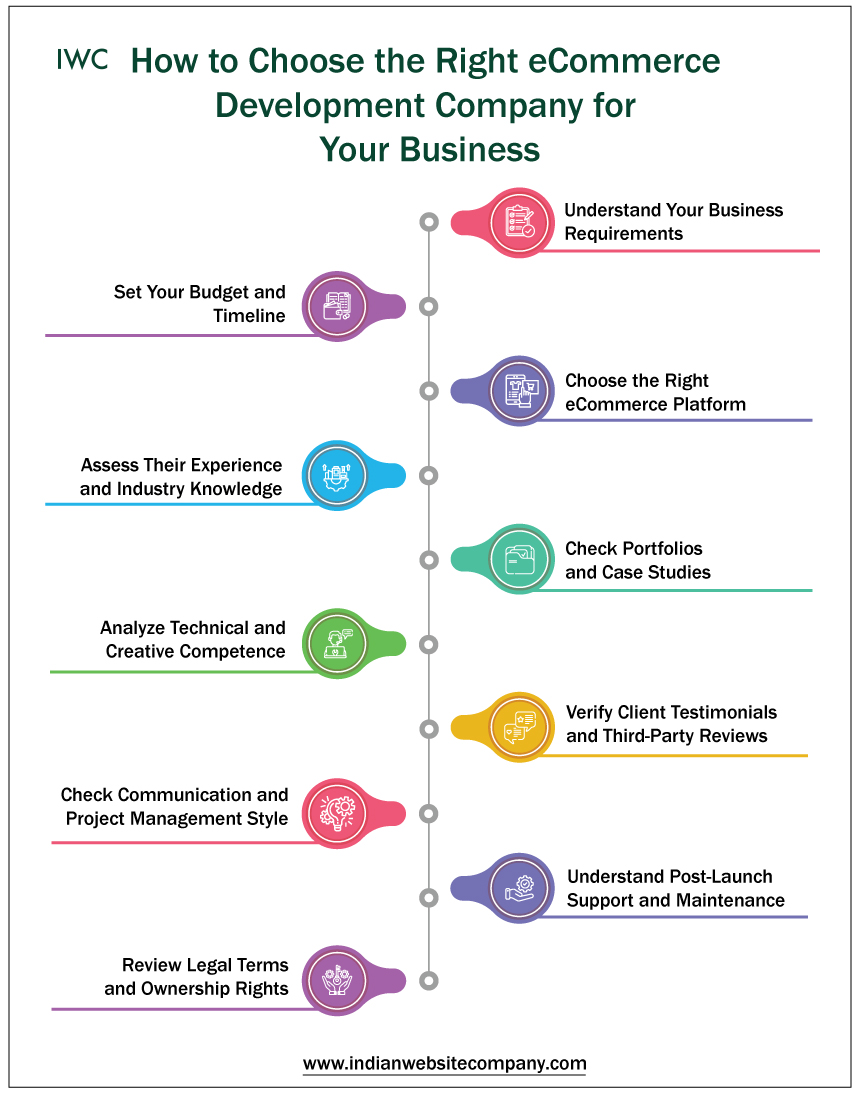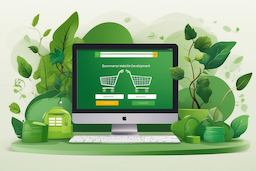How to Choose the Right eCommerce Development Company for Your Business

Modern business survival requires a well-built eCommerce platform that surpasses pure necessity. Businesses with varying sizes now require online commerce solutions to receive new customers while boosting their earnings and ensuring convenient purchasing experiences for their clients. The accomplishment rate of your eCommerce operation depends substantially on selecting the right development company with which to partner.
A specialized eCommerce development company enables businesses to construct adaptable, secure, user-oriented, conversion-focused online stores that represent their brand effectively. A wrong development partner choice leads to money and time loss while providing unsatisfactory online content to customers.
The guide presents an extensive plan which guides you through the complicated process of choosing the ideal eCommerce development company in India. The guide serves both startups planning store launches and established enterprises doing digital storefront revamps by providing you the essential knowledge and tools needed for making clear decisions.

1. Understand Your Business Requirements
The first step requires you to specify what you need exactly. You should determine basic business characteristics alongside audience targets together with product categories along with future planning objectives. Ask yourself:
Businesses need to establish their product type or service category before launching an operation.
Are you targeting B2C, B2B, or both?
The necessary system components include payment gateway functions together with product search capabilities and control of inventories and mobile device compatibility.
Your operations demand multiple languages together with multiple currencies.
Third-party tools such as CRMs ERPs and analytics platforms are included in your plans.
The clarity of your responses regarding these questions will enable strong communication of your vision and proves valuable for potential development partner alignment.
2. Set Your Budget and Timeline
Budget and timeline are essential parts of any development project. Set a realistic budget range depending on your business complexity and size. Remember that the eCommerce development cost depends on the following factors:
Custom vs. template design
Platform (Shopify, Magento, WooCommerce, etc.)
Backend integrations
Advanced features (chatbots, AI-powered recommendations, etc.)
Ongoing maintenance and support
Be honest with your prospective agencies about your budget so they can propose appropriate solutions. Also, outline your expected go-live date to ensure they can meet your timeline.
3. Choose the Right eCommerce Platform
Each eCommerce platform has its strengths and is suited for different types of businesses:
Shopify: Ideal for small to medium businesses; easy to use with built-in hosting.
Magento (Adobe Commerce): Highly customizable; suited for large enterprises with complex requirements.
WooCommerce: Ideal for WordPress users; flexible and inexpensive customization.
BigCommerce, Wix, Squarespace: Ideal for companies requiring quicker deployment with integrated functionalities.
Ensure your development partner has extensive experience in the platform you select. They must be able to suggest a platform depending on your business model, budget, and scalability needs.
4. Assess Their Experience and Industry Knowledge
Choose a company with rich experience in building high-performing eCommerce websites. Verify:
Years of business
Number of eCommerce projects done
Industry verticals serviced
Technologies they are experts in
Awards or certifications
A seasoned team will infuse your project with valuable insights and best practices. They will have knowledge of the nuances of your industry and will guide you away from common pitfalls.
5. Check Portfolios and Case Studies
Evaluating a company's portfolio provides you with a firsthand impression of their design aesthetic, technical ability, and capacity to address business issues. Note:
Variety of industries serviced
Complexity of projects worked on
Creativity and design sense
Functionality and user experience
Case studies offer insight into how the company worked to solve certain issues and what they achieved. Look for numbers such as traffic increases, improvements in conversion rate, or lower cart abandonment.
6. Analyze Technical and Creative Competence
A leading eCommerce development agency must provide a combination of sound technical skills and innovative design thinking. Assess their competence in:
Frontend technologies (HTML, CSS, JavaScript frameworks)
Backend technologies (PHP, Python, Node.js, databases)
API creation and third-party integrations
Mobile responsiveness and progressive web apps (PWA)
UX/UI design and usability testing
SEO and performance optimization
Ask if they implement agile processes and automated tests to provide high-quality, bug-free delivery.
7. Verify Client Testimonials and Third-Party Reviews
Do not just depend on testimonials on the company website. Go to independent sites such as Clutch, GoodFirms, or Google Reviews and look for unbiased opinions. Contact former clients, if possible, to inquire about their experience with:
Project communication
Meeting deadlines and budget
Problem-solving skill
Support after the launch
Ongoing positive feedback from former clients is a good sign of reliability and professionalism.
8. Check Communication and Project Management Style
Smooth communication is essential to an effective partnership. Clarify:
Who is your go-to person?
How frequently will you get updates?
What communication channels will be utilized (Slack, Zoom, Jira, etc.)?
How do they manage change requests and feedback?
An organized company will have defined processes for discovery, planning, development, testing, and delivery.
9. Understand Post-Launch Support and Maintenance
Your eCommerce adventure does not conclude upon launch. You will require periodic updates, bug fixes, security patches, and performance monitoring. Make sure the company provides:
24/7 technical support
Maintenance packages
Security audits
Performance analytics and SEO monitoring
Inquire about their SLA (Service Level Agreement) so you can see how long responses take and issue resolution guarantees.
10. Review Legal Terms and Ownership Rights
Shield your intellectual property and business data. Before signing any agreement:
Make sure the firm is open to signing a Non-Disclosure Agreement (NDA)
Lay out the project scope, timelines, deliverables, and payment terms in the contract
Ensure you will retain all source code, design elements, and content once the project is done
Transparency in legal affairs establishes trust in the long run.
Red Flags to Look Out For
Unnaturally low prices with exaggerated promises
No physical address or registered business information
Poor website maintenance or old portfolio
Platform-specific lack of expertise
Fuzzy timelines and deliverables
Aggressive sales methods
The wrong development partner can cost more, delay deadlines, and result in a bad user experience.
Critical Questions to Ask When Evaluating
How much experience have you had with [selected platform]?
Can you provide similar projects that you've worked on?
How long is a typical project timeline?
What is your pricing structure (hourly, fixed, milestone-based)?
Do you include SEO optimization and mobile-first design?
How do you manage revisions and feedback?
Who will own the final product?
Do you offer post-launch support?
How do you guarantee data security and compliance (GDPR, PCI-DSS)?
What is the process if the project exceeds the time or budget?
Common Mistakes to Avoid
Selecting an agency purely on price
Not checking platform compatibility
Forgetting long-term scalability
Forgetting user experience design
Not checking testimonials or case studies
Not clarifying scope or legal terms prior
Steering clear of these traps can save you time, money, and stress later.
Conclusion
Your eCommerce site is an online reflection of your company—and selecting the proper development partner is one of the most significant business decisions on your path forward. A trusty eCommerce development firm does not just code; they become an extension of your team dedicated to your success. By taking careful consideration of your requirements, qualifying potential partners, and defining clear expectations, you lay the foundation for long-term success. Keep in mind, the objective isn't simply to go live with a website—it's to establish a successful online company that impresses customers and generates steady returns. With an exceptional team behind you, you can develop an eCommerce experience that shines in a competitive industry and produces tangible business outcomes.
At Indian Website Company, our team of expert eCommerce website developers in India specializes in creating high-performance, industry-specific eCommerce solutions. Contact Us Today!
Recent Blogs

Top 9 Reasons to Invest in eCommerce Website Development

Why is a Dynamic Website Good?
